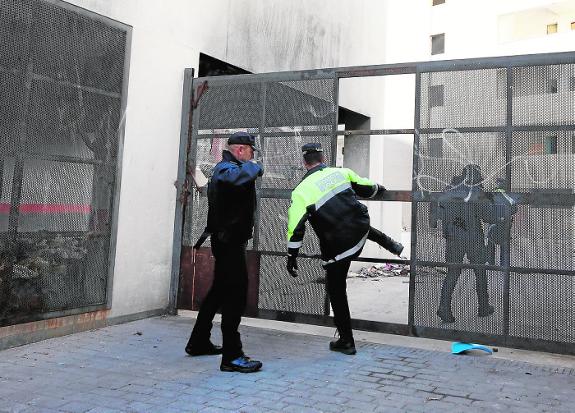Experts blame mafia-style groups for the increase in squatters
The gangs break into the properties, damage them to make them look abandoned and then 'sell' them to people who need a roof over their head
F. TORRES/I. LILLO
Lunes, 21 de septiembre 2020, 17:54
The problem of squatters, people who break into someone else's property and refuse to leave, appears to be getting worse. According to the Ministry of the Interior, last year 350 cases of this type were reported to the police, and in the first six months of this year there were 170 cases in Malaga province and 1,183 in Andalucía as a whole. However, these figures only show part of the picture, because they are the cases reported to the Guardia Civil or National Police and do not include those which are resolved through direct negotiation or intermediaries, private court cases or those handled by the regional police.
In many cases, squatting has become a business, and a growing one at that: those who use this method of obtaining a roof over their head are sometimes advised by mafia groups who find and even break into the property for them.
José María Páez, a judge in Malaga, says these mafia groups often cheat people who are in real need of somewhere to live, by telling them a property belongs to a bank or has been abandoned when in fact it is owned by a private individual.
He also says there are manuals on the internet with advice not only on how to choose and break into a property, but what to say to the police or the court "and even what type of lawyer to choose to act on your behalf". These documents also explain what tactics to use if the situation ends up in court. At the very least, the squatters can use them to delay and prolong the legal proceedings.
"There are real 'underground' estate agencies," says Luis Quiñones, a lawyer and founder of the Recupro (Recuperación Profesional de Propiedades) company, which helps people to get their homes back from squatters. The mafias look out for empty properties, find people to move in to them, electricians and plumbers to carry out illegal connections and locksmiths to change the locks so the owners can't get in. They 'sell' the squatters the keys, usually for around 1,000 to 1,500 euros.
Under the existing law in Spain, if squatters move into your property it is often difficult to get them out, which is why many people, especially those abroad who have a second home here, are investing in reinforced doors, alarms and other security measures to try to protect their property during their absence.
In theory, if squatters move in to somebody's home the eviction process should be rapid, but lawyer Javier Morales, who often acts for people in this situation, admits that this is not always the case because the police cannot identify the person or people who have taken it over. The backlog of work at the courts doesn't help. An eviction should be carried out in a matter of days, but it can take weeks or even months, even if everything is straightfoward.
Recovery firms
So, what can people do if 'okupas', as they are called in Spanish, move into their home? Or how do they prevent them doing so? One option is to turn to what has also become a growing business as a result of the increase in squatting, and use a 'desokupación' company.
There are half a dozen of these specialist firms in Malaga province, all working completely legally and with a double strategy: to control entry to the property, with a security guard and support staff, so that if someone is occupying it illegally they can't get back in when they have gone out anywhere, and to negotiate with the squatters so they move out quickly and as peacefully as possible. It costs around 2,000 to 3,000 euros to contract a service of this type, depending on the danger level and how many people are needed. These firms do not usually intervene if children are involved.
Companies such as Desokupa Exprés, Evictions Staff and Recupro have now been joined by others such as Antiokupas Group, which was recently set up in Marbella in response to the increase in properties being illegally occupied by squatters. In just one month they have successfully resolved around a dozen cases in Malaga and Seville.
These companies work with lawyers to make sure they act legally at all times, and must have permission from communities of owners for a security guard to control who enters the building or urbanisation. Once the squatters have been persuaded to leave, they change the locks and often install an alarm.
Evictions Staff, which says its business has increased by 50 per cent recently, explains that professional squatters often blackmail owners by demanding money to leave. "We get them out but we know that the next day they'll just move in somewhere else. They make a good living out of it," he says.
Desokupa Exprés says squatters should never be given money, because that just encourages them. It has also seen a big increase in business in recent months, especially in Malaga city, Marbella, Torremolinos and Benalmádena.
